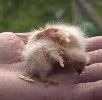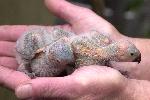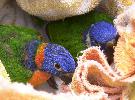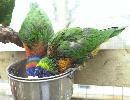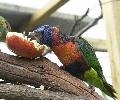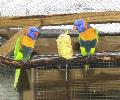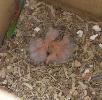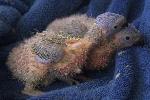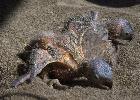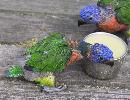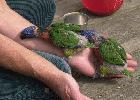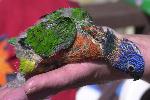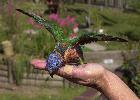Red-collared Lorikeet
Red-Collared Lorikeet, Trichoglossus haematodus rubritorquis,
is a larger size lorikeet (28cm to 32cm in length).
It has a blue head, orange chest, indigo blue lower abdomen and lower neck, a
prominent red collar at nape of the neck, yellow/green thighs, green wings
and a long tapering green/yellow tail. The eyes are a vivid orange and the
beak is bright red.
March 2000
We have one pair of red-collared lorikeets that are just coming up to breeding
age, about two years old. These two will argue and fight with any other
lories and will not tolerate any lory on the wire between their aviary
and the others on either side.
Favourite activities around humans are picking through hair (looking for
bugs, lice, nits, maggots etc..), cleaning out ears and preening eyebrows.
Testing soft ear parts, nose parts and skin blemishs is a speciality. They
will remove glasses and get underneath jumpers of other loose clothing.
click on image below to display full size
June 2000
A second pair of red-collars were bought last week, these are about a
year to 15months old and appear to be a male and female although we are
told they are from the same parents. They do not appear to be closely bonded
but still enjoy each others company for some load and boisterous
playing.
September2000
Our first pair of Red-collars have hatched two eggs 7 September 2000, both
chicks seem strong and healthy.
These images are of the babies at 4 days old and 3 weeks old . Both are
plump and well fed by their parents.
November 2000
The two baby red-collars were removed from their parents after 6 weeks as
the male had started to feather pluck both babies. Only a few feathers
on the head and back were plucked on each but we decided to hand rear them
for the last few weeks until they fledge. Both look excellent, well fed
and in good health. Although they refused food for a couple of days after
removing them form the nestbox (to their very own woolen blanked lined
plastic bucket) they soon developed a healthy appetite for honey sweetened
Complan.
click on image below to display full size
October 2000
Another pair of red-collars were bought this month, a male and female, although
they are from the same parents.
click on image below to display full size
December 2001
Our one pair of breeding Red-collars produced three more sets of two babies
throughout 2001. The first pair born in April 2001 were abandoned and killed
after 3 weeks. This was after damp nestbox material was replaced with fresh
wood shavings. The lesson learned here changed our procedures in dealing with
damp nestboxes and nestbox ventilation issues.
After one set of infertile eggs the next two were born in June 2001 followed
by another pair in October 2001. By December two more eggs are laid and fertile.
We now remove babies from this pair for hand raising at about three weeks old
although the last pair were left for six weeks.
Images below show the first pair in the nestbox just a day after they hatched.
Further images are of the second pair.
click on image below to display full size

contact us .
Page owner: <[email protected]>
Last modified: 2 January 2002.






















